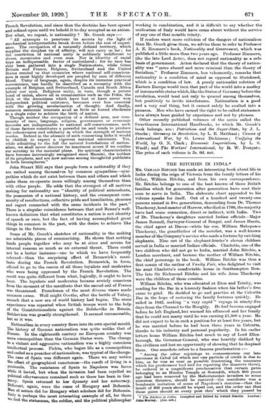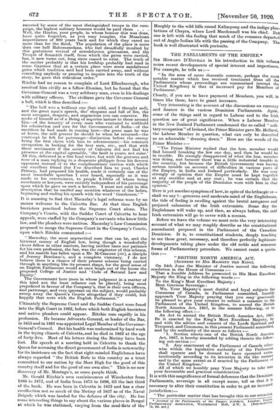THE R1TCHIES IN INDIA.*
GERALD RITCHIE has made an interesting book about life in India during the reign of Victoria from the family letters of his father, William Ritchie, and front his own correspondence. Mr. Ritchie belongs to one of the best known of those British families which for generation after generation have sent their sons to servo in India. The elaborate chart appended to his volume speaks for itself. Out of a hundred and twenty-one persona named in five generations, descending from Dr. Thomas Thaekeray, head-master of Harrow, who died in 1760, the majority have had some connexion, direct or indirect, with India. Two of Dr. Thaokeray's daughters married Indian officials—Major James Rennell, Surveyor-General of Bengal, and James Harris, the chief agent at Dacca—while his son, William Makepeace Thackeray, the grandfather of the novelist, was a well-known member of the Company's service who made a fortune by catching elephants. Nine out of the elephant-hunter's cloven children served in India or married Indian officials. Charlotte, one of the two children who did not go to India, married John Ritchie, a London merchant, and became the mother of William Ritchie, the chief personage in the book. William Ritchie was thus a first cousin of the author of Vanity Fair, who delighted to visit his mint Charlotte's comfortable house in Southampton Row. The late Sir Richmond Ritchie and his wife Anne Thaekeray were the children of these cousins.
William Ritchie, who was educated at Eton and Trinity, was reading for the Bar in a leianrely fashion when his father's firtn came to grief. He decided to go and practise at the Calcutta Bar in the hope of restoring the family fortunes quickly. He sailed in 1842, making "a very rapid" voyage in ninety-five days from the Channel to the Roughly. He had become engaged before he left England, but warned his affianced and her family that he could not marry until he was earning £1,500 a year. no did not expect to be in such a position for at least five years, boil he was married before he had been three years in Calcutta, thanks to his industry and personal popularity. In his earlier letters home William Ritchie had much to say of Lord Ellen- borough, the Governor-General, who was heartily disliked by the civilians and lost no opportunity of showing that he despised them. One anecdote refers to a famous proclamation :— " Among the other rejoicings to commemorate our late successes in Cabul (of which not one particle of credit is due to hint, as he was as near as possible frustrating the measured which his predecessor had laid for repairing the disasters there), he ordered in a magnificent proclamation that certain gates belonging to an Hindoo Temple at Somnath, which 800 years ago had been removed by the Mahotrunedan invaders to some immense distance, should be restored—the manifesto was a bombastic imitation of some of Napoleon's statutes—that the insult of 800 years should be wiped out, and the order ran that these gates should at every post thin' which they passed be • The !Males a Indio. Compiled nod Edited by Gerald Ritchie. London : John Murray. Ma. ast.1
escorted by some of the most distinguished troops in the cam. palely the highest military honours would be paid them . . . Well, the Hindus, poor people, in whose honour this was done, have quite forgotten, as you may imagine, the Musalinen impertinence of 800 years back and for which they cared no more than for the flood. The population of the place is more than one half Mahornmedans, who feel dreadfully insulted by this gratuitous revival of antedeluvian grievances, and the Temple of Somnith itself, from which the gates were carried, has, it now turns out, long since ceased to exist. The truth of the matter probably is that his lordship probably had read in some Gazeteer that at a certain place were some sandalwood gates which tradition said had been carried away, and without consulting anybody or pausing to inquire into the truth of the story, he gave this ridiculous order."
Ritchie had no reason to complain of Lord Ellenborough, who received him civilly as a fellow-Etonian, but he found that the Governor-General was a very arbitrary man, even in his dealings with military officers. The civilians gave the Governor-General a ball, which is thus described :—
" The bell was a brilliant one (but cold, and I thought sad), and the great man's speech, tho' eloquent and full of fun, the most arrogant, despotic, and ungracious you can conceive. Ho spoke of himself as of a Being of superior nature to those around him—of the insanity of every man who ventured to withhold his admiration and awe for the Government of India—of the sacrifices he had made in coming here—the great man he was at home, the still greater he should be when he returned—the contempt he felt for patronage—distinction before the enemy being the first claim with him to advancement—his constant occupation in looking for the best men, etc., and that with these sentiments if the society of Calcutta did not find his presence at the capital agreeable, the fault is yours, not mine.' All this, delivered m a fine loud voice, but with the gestures and tone of a man replying to a desperate philippic from his fiercest opponent instead of to the complimentary oration with which our excellent friend (for I've described him to you), Charles Prinsep, had proposed his health, made it certainly one of the most remarkable speeches I ever heard, especially as it was made to his entertainers, to people 9-10ths of whom being merchants or lawyers, were entirely independent of his patronage upon which he gave us such a lecture. I must not omit in this description that he omitted any mention whatever of the ladies, beginning and ending his speech with the word 'Gentlemen.'"
It is mousing to find that Macaulay's legal reforms were by no means welcome to the Calcutta Bar. At that time English barristers practised before the Supreme Court alone. The Company's Courts, with the Sudder Court of Calcutta to hear appeals, were staffed by the Company's servants who knew little law, and the pleaders were natives. Macaulay's Law Commission proposed to merge the Supreme Court in the Company's Courts, upon which Ritchie commented :— "Macaulay, the most impractical man that can be, and the bitterest enemy of English law, being though a wonderfully clever fellow in other matters, having neither taste nor patience for his own profession, the bar, was the originator of this scheme, and his mantle has fallen upon a Mr. MeCanceen [sic], a disciple of Jeremy Bentham'a, and a complete visionary. I do not believe there is a chance of their present scheme being carried through in anything like its present shape, for the good sense of an English Parliament would at once laugh out of the house the proposed College of Justice and 'Cods of Natural Law and Equity.'
The Government here (men in whose judgment in a matter of this kind not the least reliance can be placed), being most prejudiced in favour of the Company's, that is their own officers, and patronage, and very ignorant on the subject, would probably sweep away the Queen's Courts altogether if they could, but happily that rests with the English Parliament."
Ultimately the Supreme Court and the Sudder Court were fused into the High Court in 1862, before which both English barristers and native pleaders could appear. Ritchie rose rapidly in his profession. He became Advocate-General, or leader of the Bar, in 1855 and in 1861 was appointed Legal Member of the Governor.
General's Council. But his health was undermined by bard work in the trying climate of Calcutta, and he died in 1862 at the age of forty-five. Most of his letters during the Mutiny have been lost. His speech at a meeting held in Calcutta to thank the Queen for assuming the direct government of India is noteworthy for its insistence on the fact that right-minded Englishmen have always regarded "the British Rule in this country as a trust committed to our nation by the Most High for the good of this country itself and for the good of our own also." This is no new discovery of Mr. Montagu's, as some people think.
Mr. Gerald Ritchie's own reminiscences of Winchester from /866 to 1872, and of India from 1875 to 1896, fill the last third of the book. He was born in Calcutta in 1853 and has a clear recollection not so much of the Mutiny of 1857 as of the Naval Brigade which was landed for the defence of the city. He has come interceding things to say about the various places in Bengal It which he was stationed, varying from the mud-flats of the Hooghly to the wild hills round Kalimpong and the indigo plan. tations of Chapra, where Lord Macdonnell was his chief. But one is left with the feeling that much of the romance departed out of Anglo-Indian life with the passing of the Company. Tno book is well illustrated with portraits.



































 Previous page
Previous page